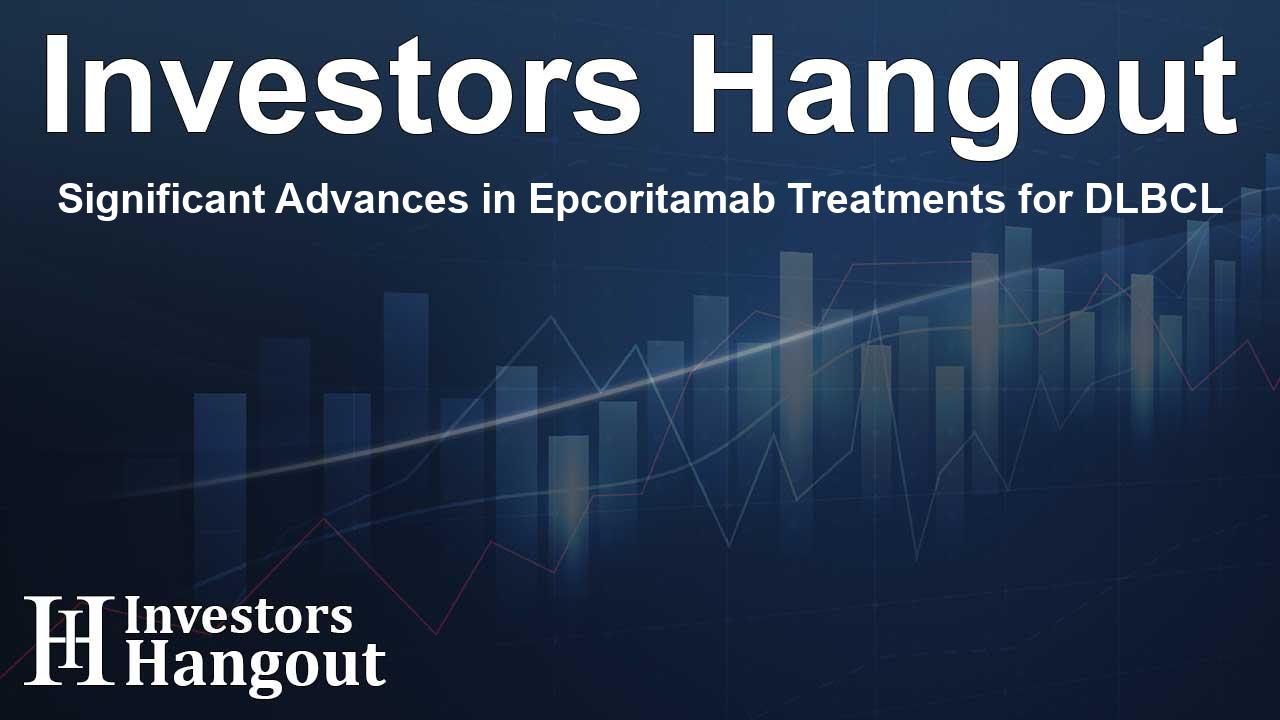Significant Advances in Epcoritamab Treatments for DLBCL

Recent Progress in Epcoritamab Trials
AbbVie recently discussed remarkable new findings on epcoritamab, a groundbreaking CD3xCD20 bispecific T-cell-engaging antibody, during a prestigious gathering for hematology experts. The results stem from two pivotal Phase 1b/2 trials designed to evaluate the effectiveness of this innovative treatment on patients with diffuse large B-cell lymphoma (DLBCL).
Understanding the Trials and Their Importance
The first arm of the ongoing EPCORE NHL-2 trial focused on administering epcoritamab in conjunction with the traditional chemotherapy regimen known as R-CHOP to patients newly diagnosed with high-risk DLBCL. Impressively, this combination exhibited a remarkable overall response rate of 100%, meaning every patient responded positively to the treatment. Furthermore, an 87% complete response rate was recorded, indicating that a significant portion of participants achieved remission. Exceedingly, among those who entered complete remission, research showed that around 83% of them maintained their remission for two years.
The Significance of DLBCL
DLBCL represents a significant portion of non-Hodgkin's lymphoma cases globally, accounting for about 25-30% of incidents. Specifically in the U.S., around 25,000 new DLBCL cases are diagnosed annually. This aggressive cancer predominantly affects elderly individuals and is slightly more prevalent among men. Many patients diagnosed with this illness may experience relapses or resistance to existing treatments, thus highlighting the importance for advancements in therapeutic options.
Epcoritamab’s Dual Approach
In a parallel study, referred to as the EPCORE NHL-1 trial, researchers analyzed the outcomes for patients suffering from relapsed or refractory DLBCL. This trial revealed that 41% of participants achieved a complete response following treatment with epcoritamab alone. Remarkably, after three years, an estimated 52% of these patients remained in remission, with a median duration of complete response lasting over 36 months.
Encouraging Insights from Safety Analyses
Another critical aspect of these trials involved observing the safety and side effects associated with epcoritamab. Common adverse reactions included neutropenia and anemia, both of which were observed in a notable percentage of patients. Additionally, cases of cytokine release syndrome (CRS) were recorded, but most of these events were classified as mild. The researchers noted that all CRS incidents resolved, crucially not leading to treatment discontinuation.
Future Prospects for Epcoritamab
As per Dr. Mariana Cota Stirner, who leads the hematology therapeutic area at AbbVie, the outcomes from these studies provide reassurance and bolster their commitment to pioneering treatment methods for DLBCL. She emphasized ongoing Phase 3 trials and expressed enthusiasm about further exploring the applications of epcoritamab for various lines of therapy, potentially establishing it as a mainstay treatment for B-cell malignancies.
Additional Information about Epcoritamab
Epcoritamab, known under the brand name EPKINLY in the U.S. and Japan, is part of AbbVie’s dedicated efforts in oncology, emphasizing the need for new treatments that effectively address diverse patient needs. The company is poised to continue evaluating the efficacy of this compound across multiple indications.
Frequently Asked Questions
What is Epcoritamab used for?
Epcoritamab is utilized to treat adults with specific types of diffuse large B-cell lymphoma that have either relapsed or proven unresponsive to previous therapies.
What were the outcomes of the recent trials?
The trials indicated an overall response rate of 100% and a complete response rate of 87% combined with standard chemotherapy in high-risk DLBCL patients.
How does Epcoritamab work?
Epcoritamab is a bispecific antibody that engages T-cells to selectively target and kill B-cells, aiming to elicit an immune response for treating cancer.
Are there any significant side effects associated with Epcoritamab?
Common side effects include neutropenia, anemia, and cytokine release syndrome, although most report cases as mild and resolvable without discontinuation.
What are AbbVie’s future plans for Epcoritamab?
AbbVie aims to continue investigating Epcoritamab’s safety and effectiveness across various therapeutic settings, with ongoing Phase 3 trials and additional studies planned to expand its therapeutic use.
About The Author
Contact Logan Wright privately here. Or send an email with ATTN: Logan Wright as the subject to contact@investorshangout.com.
About Investors Hangout
Investors Hangout is a leading online stock forum for financial discussion and learning, offering a wide range of free tools and resources. It draws in traders of all levels, who exchange market knowledge, investigate trading tactics, and keep an eye on industry developments in real time. Featuring financial articles, stock message boards, quotes, charts, company profiles, and live news updates. Through cooperative learning and a wealth of informational resources, it helps users from novices creating their first portfolios to experts honing their techniques. Join Investors Hangout today: https://investorshangout.com/
The content of this article is based on factual, publicly available information and does not represent legal, financial, or investment advice. Investors Hangout does not offer financial advice, and the author is not a licensed financial advisor. Consult a qualified advisor before making any financial or investment decisions based on this article. This article should not be considered advice to purchase, sell, or hold any securities or other investments. If any of the material provided here is inaccurate, please contact us for corrections.
